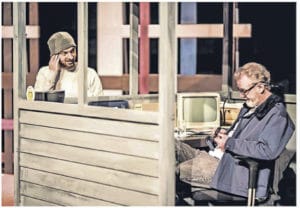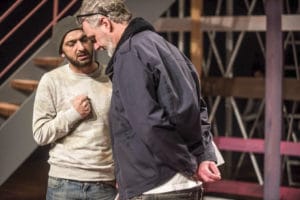I attended the try-out of Metropolis #1 at The Hague's Theater aan het Spui and a week later - because I couldn't believe my eyes the first time - I also went to the premiere. Rarely did I see something so blood-curdlingly exciting on stage. But unfortunately for the wrong reasons.
A lot of a-musical notions
Metropolis is theatre-maker Sadettin Kırmızıyüz's new four-part series. Part 1 focuses on 'the core theme of education'. Metropolis is based on stories of pupils, teachers and politicians on interviews with authorities from the world of education in The Hague. This produces a lot of a-musical notions such as immigrant quota, average success rate budgeting, protocols, anti-radicalisation and compulsory education. Make a nice play out of that.

Metropolis 1 plays at Orange College. A fictional school with real problems. Erika is the stroppy headmaster who wants to make her school 'excellent' and is over the moon about it. Otto is the heavily empathetic caretaker who mirrors Mahatma Ghandhi, Brammetje a gifted pupil in big trouble. He owes 15,000 euros to a criminal Turk. The Hague's Alderman for Education Saskia Bruines said of the play in the Volkskrant: 'De Luizenmoeder, but different.' You hold your heart.
'No, he should not die'
The actors did their own research, opting for "a thorough documentary approach" and set to work together writing lyrics and improvising. Two weeks before the premiere, the end of part 1 was not yet fixed, So I read on this site. Maker Sadettin Kırmızıyüz said: 'Yes, where does that end? We're working on the end now and for now it's, "No, I think he should die!", "No he shouldn't die, he should kill someone!", "No that's not good!". So we haven't figured that out yet. Well the end always comes last.'
'Really happened is no excuse'
Writer Gerard Reve formulated The Law of Unreality. 'Really happened is no excuse,' the writer said. Yes, reality can be pretty nasty. Movies or plays that are pitched with the accolade 'based on true events' are often unpalatable. You need a real writer to make something of it. The first try-out came on Wednesday 28 February and it was dramatic, unfortunately not in the theatrical sense of the word. The characters were caricatures and psychologically flat as a pancake. Director Erica, played by Antoinette Jelgersma, is as Captain Ahab in search of Moby Dick. Uncompromising and adamant on course for the 'excellent school' designation.

The young, well-educated history teacher with a non-Western background who stands up for the pupils ('lots of VOC and very little slavery in the textbooks'), a walking cliché, is fired by Erica and thrown out of the school gate by the 'atmosphere guardian'. A white pregnant student is given an urgent 'abortion' recommendation by the headmistress within a second and is downgraded from havo to vmbo, lest the sacred pass rate be jeopardised.
'Every alleged joke dropped dead'
The play was a mess and lacked depth. It could not be down to the players. Stefan de Walle - when he wants to - has the smile on his 1.93-metre body. He struggled in his one-dimensional role of over-empathic caretaker and was not for a moment touching or funny, which he had promised in The Hague weekly De Posthoorn: 'there is a lot of laughter in the play'. There were hardly any laughs and every supposed joke fell dead. Then humour can be painful. Kaspar Schellingerhout played pupil Bram. Amidst all the platitudes, he portrayed a rather natural schoolboy. And that was very clever, especially when saddled with such a cracklingly indigestible finale.
Painful silence, pleurisy broke out
I remember theatre-maker Sadettin Kirmiziyüz as the man behind somedaymyprincewill.com (2012), a contemporary Turkish fairy tale full of hilarious multicultural problems, which swung like a Brazilian samba. Something must have gone intangibly wrong during the preparation of Metropolis. After the curtain fell on the try-out, a painful silence reigned. Immediately afterwards, all hell broke out at The National Theatre. Four-part Metropolis, a close collaboration with Trouble Man, Kırmızıyüz's company, is one of HNT's major projects for the next four years. This opening part needed to be much better. The premiere was postponed and director Jeroen de Man was tasked with saving what could be saved.
What can you still do in three, four days?
Last Friday, March 9, was the postponed premiere. It smelled like García Márquez's Chronicle of an Announced Death. At the beginning, the play definitely showed more speed and swirl. As the audience entered, student Bram was playing basketball lustily, caretaker Otto joined him for a warm chat. The turnout with five characters in black and white attire was stormy and promising. Care had rightly been taken to deepen the characters' personalities. The caretaker was slightly more normal but it didn't stop there. He was now talking about his retirement, the reason he regularly spoke into blogs in a microphone. Those pointless blogs, as in the try-out, took considerable momentum out of the play; it remained contrived.
'Pussy, pussy': an oral nervous tic
Antoinette Jelgersma flogged the stage like a centre-forward who desperately wanted to score. Quite understandable but it led to overacting. A nice addition was: 'When my son died, I started teaching the very next day.' The headmistress had added an oral nervous tic as a running gag. She now regularly shouted 'pussy, pussy', which, while humanising her, also made her droll and grotesque. With a different basic approach to the play, it would possibly work. Now she became a very hybrid character. Sadettin as the villainous Turk was also slightly humanised but remained comicly mean. He smashed trees and did something unclear with a bag of drugs (?) among the leaves, the audience remained confused about this. Apprentice Bram got a different ending, which we won't reveal anything about here.
Going down in a primordial soup of educational terms
The actors fought to survive. The saggers in the play remained. It didn't work out. It was also an impossible task. A water-making vessel does not become a gondola within a week. The players went down monumentally in a primordial soup of educational terms. It was - for the initiated - definitely impressive, I have never sympathised so much with a cast.
Is there anything to learn from The Caste Mother?
Yep, there is definitely something to learn from The Caste Mother. Less moralism and more drama and psychology, for a start. The now world-famous Juf Ank from De Luizenmoeder quickly became a beautifully layered character, when she totally unexpectedly and thinking of her asshole of an ex-husband lectured an oblique father. The whole of the Netherlands cheered up from the sofa. In De Luizenmoeder, the bureaucracy of education is captured in one motif: that damn protocol. Excess damages. The rest the audience thinks is there. How so? Because there is an experienced writing team behind it that didn't take any chances. Other than that, every comparison fails.
Create vibrant theatre or write a letter to the Volkskrant
Metropolis #1 is bravely programmed for the next four nights in Utrecht, Theater Kikker. This will be followed by Maastricht, Rotterdam, Zwolle, Nijmegen. Each night of play will be a little better & more logical. But whether the wrecked little ship will make it across? 17 April Metropolis is programmed again in The Hague. Áf they come back, I will definitely go and watch and treat the whole cast to champagne. The moral: make vibrant and oppressive theatre or write a long letter to the Volkskrant.
De Walle behind a glass of red wine
After the premiere in The Hague, I saw actor Stefan de Walle lonely down the slope from Hall 1 to the café. He greeted his two grown sons with a kiss on their crowns and sat dead still behind a glass of red wine. I was moved for the first time that night.
